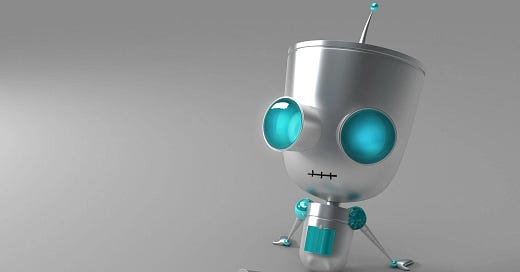The idea behind Universal Basic Income (UBI) is pretty simple: the government gives each person a chunk of money to prevent poverty. You can work if you want, but it’s not required. You just get money.
UBI seems to be attractive to two groups of people: progressives who believe that you can eliminate poverty just by taxing the wealthy and folks who want to eliminate the welfare state and replace it with lump sum payments. The problem is that the estimated cost of UBI is HUGE - about $3.9 trillion. That is about 4.5 times the size of the Pentagon’s budget, a mere $850 billion. For the folks who want to get rid of social services and give a lump sum instead, I’ll nod to Uncle Milton: “There’s no such thing as a temporary government program.”
Here, I’ll make a wacky sci-fi/futurist proposal that cuts government out of the picture and is a plausible path to UBI: artificial intelligence. I’m going to argue that UBI is possible using AI. The idea: Each person gets to own an AI that will legally procure $1 each year for them by doing some sort of work in the economy.
That’s it.
You may ask, “how will this possibly be the path to UBI?” Allow me to explain.
First, you have to buy into the idea that an AI can get you a dollar. This seems pretty simple. For example, an AI might rent out computing power on your phone. Or maybe do a day trade that guarantees at least $1 in income. The economy is huge, and an AI can probably try out hundreds or thousands of ways for you to get $1. I think this first step is a low bar and it’s probably true that we can have 330 million AI’s find a dollar for each person in the US. The total income needed for this scheme is $330m and the total GDP of the US is $30.4T - about one million times larger. In other words, it’s not hard to imagine that an army of AI’s can gather about .01% of the economy and channel it into UBI.
Second, if you can accept the first step, at some point you can grow your UBI-AI from $1 a year to some larger number. This can happen in many ways but two stand out: economic growth and algorithmic efficiency. As the economy grows, there is simply more economic value to be harvested by AIs. Renting out computing power from your cell phone might be worth, say, a nickel in 2026 but it might be worth a dime in 2046. Growth matters. Once the UBI-AI is implemented, we can also expect increases from better programming. An improved AI can more quickly find pennies, which adds up. If you buy these two simple and probably true points, then it’s easy to see how AIs might generate a level of additional income that would be noticeable.
You might ask if I am promising that an army of AIs will magically solve poverty by generating infinite wealth. I don’t think so. There is nothing in what I wrote that suggests that there will be infinite growth. The income provided by your private AI cash army will be constrained by computing power, economic growth, and other factors. Also, as ordinary income, it would taxed. Still, I don’t think it’s crazy to hypothesize that (a) every person can have a little “cash angel” who gives them $1 this year and (b) economic growth and technology improvements will increase that well beyond $1 over a few decades. It may not be full blown yearly income for a family, but it would help a lot of people.
The UBI-AI idea has some other nice properties. It’s not inflationary because the government isn’t handing out cash. The cash angels just collect value that’s already in the economy. Also, it is compatible with other policy bundles. Your little cash angel can exist next to a welfare state no matter its size.
Bottom line: AI and UBI people should start talking to each other.
+++++++
Buy these books!
Sociology and Classical Liberalism (Open access/free)
Grad Skool Rulz - cheap ($5) advice manual for grad students
Obama and the antiwar movement
A Social Theory book you will enjoy reading





You might see some cross over https://open.substack.com/pub/oswald67/p/a-saving-grace-from-the-ai-tsunami?r=2r3au&utm_campaign=post&utm_medium=web&showWelcomeOnShare=false